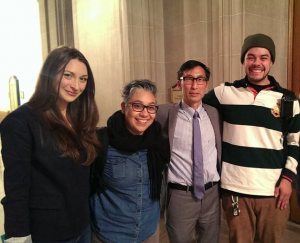“With YLI, I gained the sense of empowerment that young people do have the opportunity to get involved in policy; they can and they do make change.”
Southern California native Amanda Trescott arrived in San Francisco to begin her undergraduate career in 2008 and has remained here ever since, including a six year period with YLI programs. Halfway through her college experience she was successfully recruited in her campus for a paid internship with YLI’s TURF (Tobacco Use Reduction Force) Program, marking the beginning of her tenure with the Youth Leadership Institute.
When Amanda graduated, she was hired by YLI and stayed with the organization for a total of six years. After working with YLI for a year, she realized that she wanted to attend graduate school to obtain a Master’s in Public Policy, a decision very much informed by her experience with YLI and their focus on tobacco policy. She is now scheduled to earn her Master’s of Public Administration in the spring of 2016.
 Amanda’s interest in local and city policy was initially sparked by her participation in the TURF (Tobacco Use Reduction Force) program. TURF has made great strides in its mission to reduce youth access to tobacco by regulating the number of tobacco outlets scattered throughout San Francisco. In fact, in December 2014 TURF’s efforts culminated in the passage of an ordinance that stops the issuance of new tobacco permits within low-income neighborhoods with already high tobacco densities. The ordinance was introduced by San Francisco Supervisor Eric Mar and will propel equity in the number of tobacco permits per district. This policy was the result of several generations of youth organizing over a six year period.
Amanda’s interest in local and city policy was initially sparked by her participation in the TURF (Tobacco Use Reduction Force) program. TURF has made great strides in its mission to reduce youth access to tobacco by regulating the number of tobacco outlets scattered throughout San Francisco. In fact, in December 2014 TURF’s efforts culminated in the passage of an ordinance that stops the issuance of new tobacco permits within low-income neighborhoods with already high tobacco densities. The ordinance was introduced by San Francisco Supervisor Eric Mar and will propel equity in the number of tobacco permits per district. This policy was the result of several generations of youth organizing over a six year period.
Reflecting on her life changing exposure to public policy and the political process through YLI, Amanda admits, “I wasn’t interested in it and had no knowledge of it…I truly didn’t see how non-politicians – just community folks and especially young people – had any role in influencing policy or advocating for social change.”
As a youth advocate, the most enriching experience the Youth Leadership Institute gave her was exposure to the entire field of social justice. From facilitating meetings as a youth intern, and then later as a staff member who directed San Francisco’s Social Norms Programs, YLI is where she learned how systems impact folks across all communities. The Social Norms Programs in particular attempt to address this impact by debunking common misconceptions of extreme youth substance use. The Social Norms Programs does this by surveying youth in the community and publicly disclosing the reality – lower rates of usage. Social Norms campaigns are supporting young people to live healthier lives.
Amanda acknowledges, “Coming from a privileged background, I didn’t know how to interact with young people who have had to deal with systems of oppression every day.” Amanda works from her social location as a white and middle class American woman as an ally who collaborates for social justice. In this area, YLI played a huge role in teaching her the significance of supporting people who are the most impacted by social inequities in the political process. This perspective has informed her approach to graduate school and inspired her interest in knowing where young people fit in the shaping of policy.
Summing up her work in and for youth development she concludes, “Youth leadership is being able to look at your surroundings, identifying the systems that help you and the systems that negatively affect you. Leadership is the ability to call out those systems that negatively impact you and not only having a desire to change them, but being action and solution oriented to change them. It means identifying what is going on, wanting to change those systems and actively engaging in that change.”
